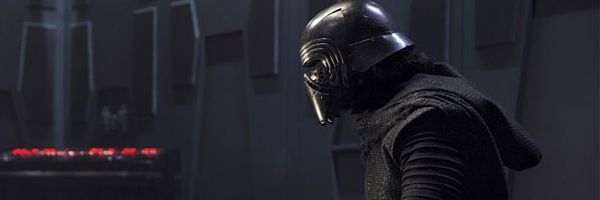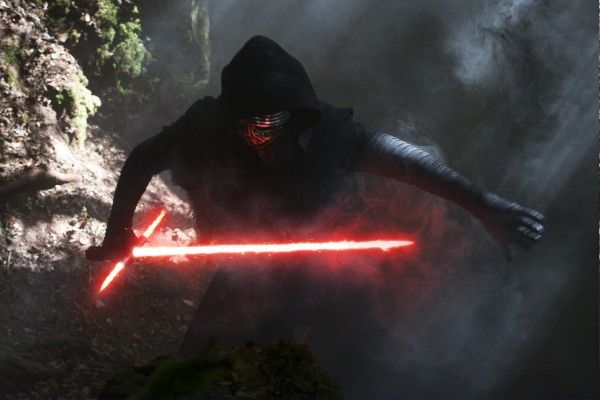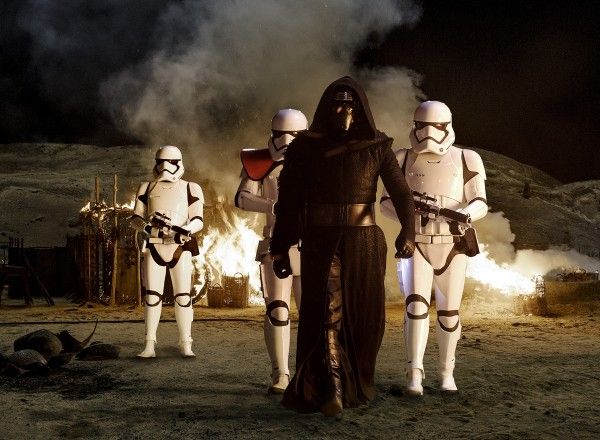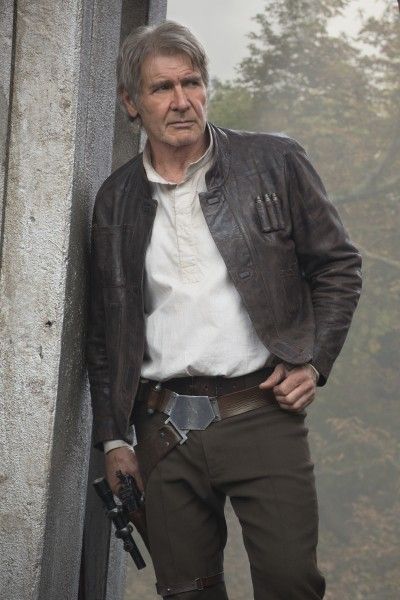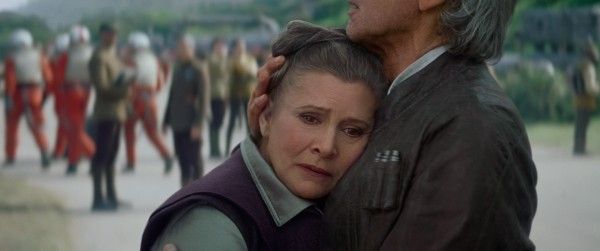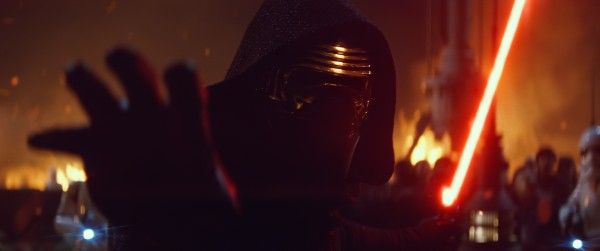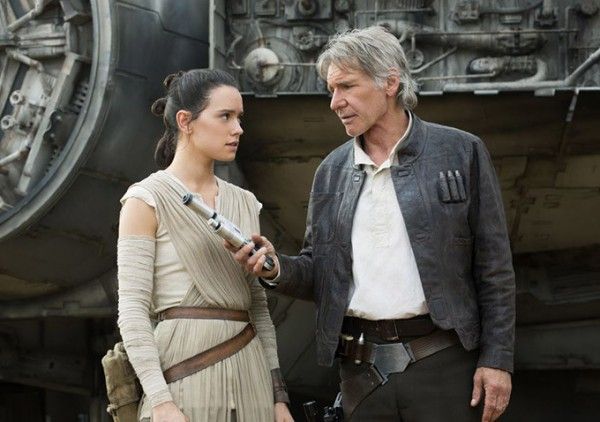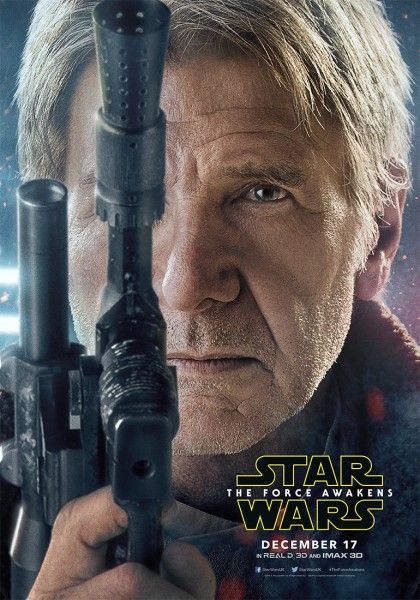If you haven’t seen Star Wars: The Force Awakens, this is your official SPOILER WARNING—turn back now!
-
-
-
-
-
-
Okay, we good? Judging by the film’s box office most of you have seen Star Wars: The Force Awakens by now, which means you’re well aware that Harrison Ford finally got his wish: Han Solo is dead. And at the hand of his own son, no less! Indeed, while Solo’s death kind of felt inevitable within the context of the film, especially given the finality of Ford’s last scene with Carrie Fisher, the execution of the death scene and the performances of Ford and Adam Driver were stellar, resulting in a pretty spectacular Star Wars moment.
But how did this come to pass? When did J.J. Abrams decide he was going to kill Han Solo? Not for a while, actually. At a WGA screening of The Force Awakens this weekend, Abrams, co-writer Lawrence Kasdan, and screenwriter Michael Arndt—who wrote the initial drafts of The Force Awakens before Abrams and Kasdan took over scripting duties—participated in a Q&A (via Entertainment Weekly) where they addressed the climactic scene in which Ben Solo kills his father, Han. Kasdan began by addressing the thematic draw of the Star Wars saga as a whole:
“People always say, ‘Why do you think this saga is so popular? I really do believe the underlying theme is recognizing your potential and understanding what you’re capable of. It doesn’t end. To understand what you’ve inherited, and what you like about that and what you don’t like about that. Have you fulfilled yourself completely — or is it too late. What is dormant? That’s a very real and tangible thing for people every day.”
To that end, Kylo Ren is realizing his full potential in killing his father—it just happens to be for the Dark Side, not the Light. As Abrams tells it, he always wanted to craft a story that was as much about the evolution of the new trlogy’s villain as it was about its heroes:
“Long before we had this title, the idea of The Force Awakens was that this would become the evolution of not just a hero, but a villain. And not a villain who was the finished, ready-made villain, but someone who was in process.”
Abrams and Co. knew they had the looming shadow of Darth Vader hanging over their heads, so the only way they could feasibly top him was to get ambitious:
“Star Wars had the greatest villain in cinema history. So, how you bring a new villain into that world is a very tricky thing. We knew we needed to do something fucking bold. The only reason why Kylo Ren has any hope of being a worthy successor is because we lose one of the most beloved characters.”
But it wasn’t immediately clear that their trajectory would be leading them to the murder of Han Solo. Arndt revealed that in his initial drafts of the script, Kylo Ren was simply the wedge that forced the Original Trilogy apart following Return of the Jedi:
“In my early drafts, my thinking was we had to bridge the end of Return of the Jedi to what happens in this movie, and we didn’t want everybody to start off all together. We wanted them to be spread all throughout the galaxy. We came up with a backstory that Luke had a pupil who turned against him and fought him, and killed all the other pupils, and that was a thing that exploded the family and destroyed Han and Leia’s relationship.”
In those drafts, Episode VII ended with the reconciliation between Han and Leia, but Abrams rightly pointed out that this iteration of the story made Han Solo a superfluous character:
“I had thought Han’s story and Leia’s story was just about them coming back together. At the end of the movie they would have reconciled and gotten over their differences. And you would have said, ‘Okay, bad stuff happened, but at least they’re back together again. J.J. rightly asked, ‘What is Han doing in this movie?’ If we’re not going to have something important and irreversible happen to him, then he kind of feels like luggage. He feels like this great, sexy piece of luggage you have in your movie. But he’s not really evolving. He’s not really pushing the story forward.”
As Abrams recalls, it was a tough decision to make, but ultimately the right one for the story they wanted to tell:
“[Han Solo’s death is] this massive tradeoff. How can we possible do that!? But… if we hadn’t done that, the movie wouldn’t have any guts at all. It felt very dangerous.”
The killing of Han Solo acts as the full birth of Kylo Ren, with the character proving to himself that he’s destined for the Dark Side. And yet it's followed by this tender moment with a father touching his son's face in his final moments. It's this and Driver's brilliantly complex performance that gives us hope that Kylo Ren could be one of (if not the) all-time great Star Wars villains, and his patricide only complicates his story/emotions further. In this way, the return of Han Solo is fully justified and sets the stage for a fantastic trajectory in the next two sequels.
For more on Star Wars: The Force Awakens, peruse the recent links below.
- Which 'Star Wars: The Force Awakens' Character Was Originally Supposed to Die?
- ‘Star Wars: The Force Awakens’ Global Box Office Beats ‘Jurassic World’ After All
- ‘Star Wars: The Force Awakens’ Writers Talk About Previous Versions of the Script
- ‘Star Wars: The Force Awakens’: What’s the Deal with R2-D2?
- Bad Intel: Here’s a Bunch of ‘Star Wars: The Force Awakens’ Rumors That Were Wrong

